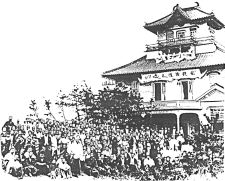
Although there aren't any castles on the Miho Peninsula of Shizuoka City today, a ultra-nationalistic organization known as the "National Pillar Association" [Kokuchuukai] once erected a castle-like structure there. From 1911 to 1937 this organization provided some of the ideological fuel for Japanese expansion during the early Showa era. This article outlines the founder of that organization, Tanaka Chigaku.
Born in Feb. 1861 in the Nihonbashi section of Tokyo as the third son of an eminent physician, Chigaku's parents passed away before he was eleven. He then came under the care of Rev. Kawase Nichiren, head of a small temple in Asakusa. In 1870 Chigaku began an in-depth study of Buddhist scriptures, Chinese poetry, and philosophy at Myoukakuji. An uncompromising character, Chigaku believed from an early age that he had a special mission: to spread Nichiren teachings. In his youth, he quarreled more than once with other clergy members and felt many priests were too lax. In 1879 he decided to leave the clergy and launch his own spiritual campaign.
For a brief period of time he worked for a German engineering company in
Yokohama. However, he found it difficult to focus on mundane activities. Chigaku was far more interested in spiritual proselytizing. In 1881 he became active in a small group devoted to spreading Nichiren's teachings known as the "Nichiren-kai". That September he started lecturing on Buddhism. Gradually he developed an ardent group of supporters (and opponents) in the Kanto area.
In Nov. 1881 Chigaku married a Nichiren adherent from Karuizawa named Mine Kirigaya. Three months later a child was born, only to die within fifty days. In 1883, 1888, and 1897 sons were born to their family. Between 1898 -1907 the Tanakas had four daughters. Chigaku's wife provided moral support for Chigaku and his views on marriage are summarized in a 1887 essay "On Buddhist Matrimony".
At the age of 26 Chigaku opened an office in Tokyo. Emphasizing the need for religious reform in Japan, he came to regard the Emperor as a manifestation of Nyorai, a Buddhist-Godhead. Chigaku viewed Christian missionaries as "foreign invaders" and encouraged Japanese to develop their national identity. He was one of the first persons in Japan to use ideological mass-marketing techniques astutely. Though he reviled Western missionaries, he nonetheless adopted many of their methods.
By 1890 Chigaku was lecturing extensively throughout Honshuu. With a heavy schedule of commitments, at times he suffered from mental exhaustion and eye strain. Behind the podium, however, he had charismatic power. Chigaku was probably one of the most skilled Japanese public speakers at the turn of the 19th century. Lecturing to small audiences at first, by the end of his life he often addressed thousands.
When the Sino-Japanese War broke out in 1895 Chigaku moved his headquarters to Osaka. Constructing a special temple, he assembled prayer groups to chant for victory in the war against China. Chigaku creatively fused Tendai and Nichiren ceremonies with Shinto principles of Emperor worship.
In 1897 Chigaku began publishing a magazine about Nichiren's teachings known as Myoushuu. Within ten years this became a publication with a readership in the tens of thousands. In 1912 this merged with Nichiren Shuugi [Nichiren Advocate] to become the Kokuchuukai Shinbun [National Pillar News]. The title of the publication was later changed to "Seikatsu no Reika" [Spiritualizing Daily Life].
In 1908 Chigaku moved his headquarters to Miho. Converting an area of Kaijima which was a garbage heap into a place of beauty, Chigaku felt we should create beauty and whenever possible and respect the environment more. In the 1930's when government leaders in Shizuoka decided to convert Kaijima into a landfill connected to the Miho Peninsula, Chigaku objected. As Kaijima was gradually became covered with asphalt and Miho itself connected to the mainland, Chigaku moved his headquarters Tokyo.

In 1914 Chigaku founded the "National Pillar Society", a nationalist group concerned with a range of moral and spiritual issues. This grew to become an influential movement in Japan whose repercussions are felt even today. Chigaku believed in Nichiren's prophecy of the ultimate spiritual unification of Japan. By 1905 he went further, asserting that Japan had an important role in unifying the world. His message was received by many
members of the discontented urban middle class and his followers included Ishiwara Kanji, Kita Ikki, Takayama Chogyuu, and Anesaki Choufuu. Even Chigaku's opponents conceded he had charisma and creativity.
In addition to spiritual proselytizing, Chigaku had a keen interest in traditional Japanese theatre and art. Highly talented, he composed and performed several dramas to highlight various moral themes. His collected works comprise thirty volumes and many fine poems, songs, and essays came from his pen. Chigaku was much more than a right-wing nationalist or religious fanatic: he was a complex individual with many intriguing facets.
In 1939 Chigaku passed away at the age of 79. Several thousand persons attended his funeral and today he rests inside the Myoushuu Mausoleum in Tokyo.